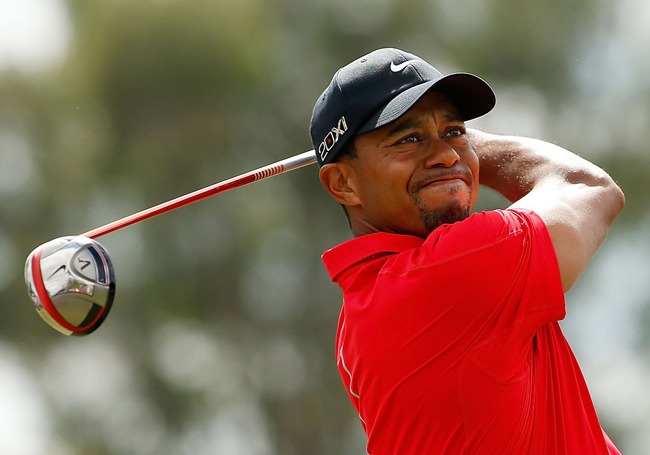Top 10 PGA Golfers of All Time

10. Gary Player
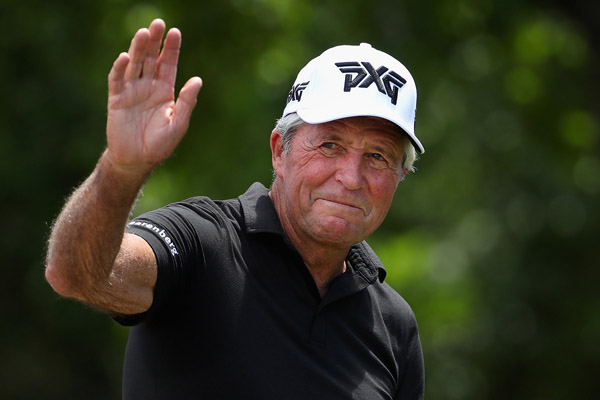
PGA Tour Victories: 24
Majors Won: 9 (1959 British Open, 1961 Masters, 1962 PGA Championship, 1965 U.S. Open, 1968 British Open, 1972 PGA Championship, 1974 Masters, 1974 British Open, 1978 Masters)
If professional wins on all tours were counted, Gary Player would rank a few spots higher on this list. The South African golfer won tournaments on every continent except for Antarctica.
Player won 63 events in South Africa and has been credited with 165 professional victories on various tours, spanning from 1955 to 2015. But since we’re specifically ranking the top PGA golfers, Player only has 24 wins that matter, which isn’t even half the total of most of the men ranked ahead of him.
On the one hand, it’s impressive that he spread those wins out over the course of two decades, winning majors at the ages of both 23 and 42. On the other hand, he never won more than three PGA Tour events in the same calendar year, making it tough to argue he was ever the best in the world.
9. Tom Watson
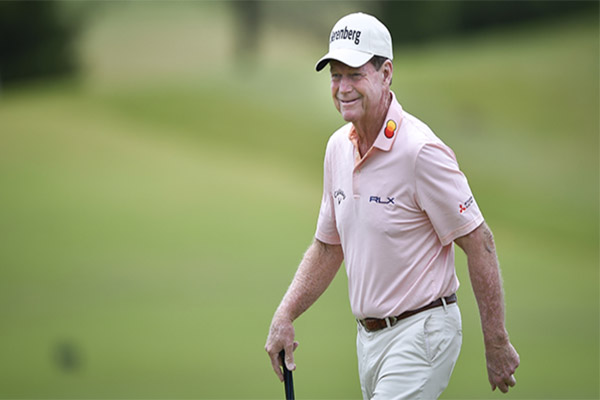
PGA Tour Victories: 39
Majors Won: 8 (1975 British Open, 1977 Masters, 1977 British Open, 1980 British Open, 1981 Masters, 1982 U.S. Open, 1982 British Open, 1983 British Open)
Few men have dominated an individual major quite like Tom Watson did the British Open. Watson won that event five times in the span of nine years (1975-83), tied for second in year No. 10 of that streak (1984) and incredibly forced a playoff before finishing second in 2009 at the age of 59.
Jack Nicklaus (six Masters, five PGA Championships) and Peter Thomson (five British Opens) are the only other golfers since 1930 to win the same major at least five times in a career.
Watson was no one-trick pony, though. He also won the Masters twice, won the U.S. Open once and had eight second-place finishes in majors. He placed top-10 at least 10 times at each of the four majors, which is a feat only he and Nicklaus can boast.
Despite a long career and all those top-10 finishes, Watson’s peak was shorter than most of the all-time greats. Of his 39 wins on the PGA Tour, 33 came from January 1977 to July 1984.
He was named the PGA Player of the Year in six of those eight years (1977, 1978, 1979, 1980, 1982 and 1984), but he didn’t win much outside that window. This is why Watson is outside the top 10 in career PGA Tour wins and sixth in major titles, even though he was the king of the links for almost an entire decade.
8. Byron Nelson
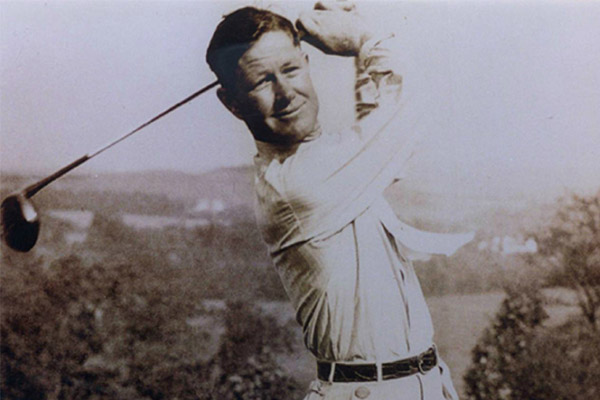
PGA Tour Victories: 52
Majors Won: 5 (1937 Masters, 1939 U.S. Open, 1940 PGA Championship, 1942 Masters, 1945 PGA Championship)
Several of the top 10 golfers were impacted by either World War I or World War II, but none quite like Lord Byron.
Unfortunately, from 1943 to 1945, the only majors held were the 1944 and 1945 PGA Championships. Nelson was the runner-up in 1944 and the winner in 1945.
7. Arnold Palmer

PGA Tour Victories: 62
Majors Won: 7 (1958 Masters, 1960 Masters, 1960 U.S. Open, 1961 British Open, 1962 Masters, 1962 British Open, 1964 Masters)
“The King” won 62 tournaments over the span of nearly two decades, including seven majors between 1958 and 1964. Four of those wins were at the Masters, a total only Jack Nicklaus and Tiger Woods have reached.
Palmer got 29 of his victories in a four-year span from 1960 to 1963, winning at least six events in each of those years. Neither Woods nor Nicklaus ever had a four-year streak with six or more wins in each year.
Not surprisingly, Palmer was named the PGA Player of the Year in both 1960 and 1962, winning two majors in each.
There were a ton of “close but no cigar” results in Palmer’s career, too. Forced to share some of the spotlights with Nicklaus and Gary Player during their respective primes.
This member of “The Big Three” of golf was the runner-up in 10 majors—one each year from 1960 to 1968 and once more in 1970. In 1962, 1963 and 1966 U.S. Opens, Palmer fell short in 18-hole playoffs.
6. Sam Snead
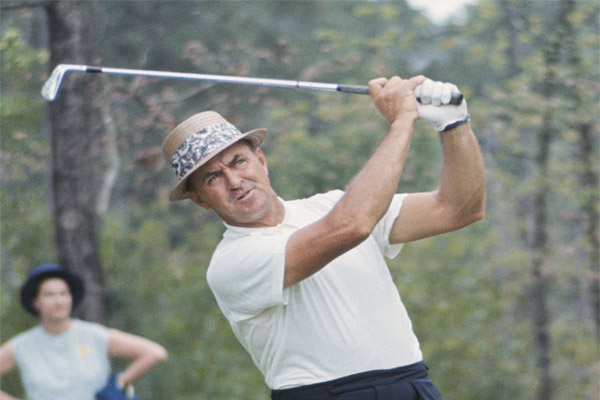
PGA Tour Victories: 82
Majors Won: 7 (1942 PGA Championship, 1946 British Open, 1949 Masters, 1949 PGA Championship, 1951 PGA Championship, 1952 Masters, 1954 Masters)
Though Sam Snead is nowhere close to first place in major championships, he is the all-time leader in PGA Tour victories. There are three primary reasons Snead failed to win more than seven majors.
The biggest one is that he only played the British Open five times in his career—compared to 44 times competing at the Masters. Per Bob Carter in a feature for ESPN, Snead only played in (and won) the 1946 British Open because of “contractual ties to a sponsor” at St. Andrews.
World War II was another big factor, as a total of 14 majors were cancelled from 1940 to 1945. Because of that, Snead missed out on a bunch of opportunities from ages 28 to 33—an age range in which Tiger Woods won six majors and Jack Nicklaus won five.
Last, but not least, the U.S. Open alluded Snead for his entire career. He had 12 top-10 finishes at the U.S. Open and was the runner-up four times, but that major was his white whale.
5. Bobby Jones
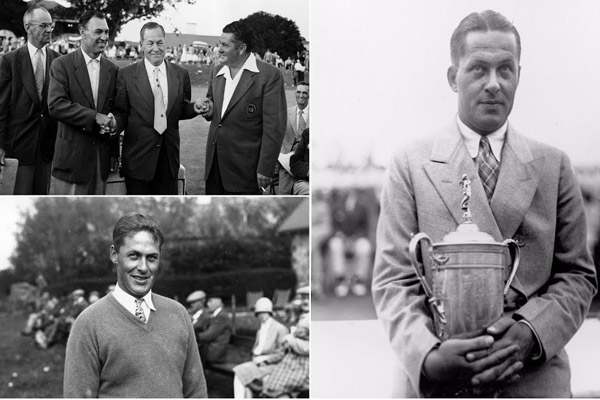
PGA Tour Victories: 9
Majors Won: 7 (1923 U.S. Open, 1926 U.S. Open, 1926 British Open, 1927 British Open, 1929 U.S. Open, 1930 U.S. Open, 1930 British Open)
Bobby Jones is the ultimate asterisk in the PGA’s record books, winning seven majors despite only being eligible to play in 50 percent of them during his short career.
The Masters was not an event until Jones co-founded it in 1934—four years after he retired. Jones did play in the Masters on an exhibition basis from 1934 to 1948. However, it was the only tournament he played in beyond 1930, and he never finished in the top 10 of it.
4. Walter Hagen
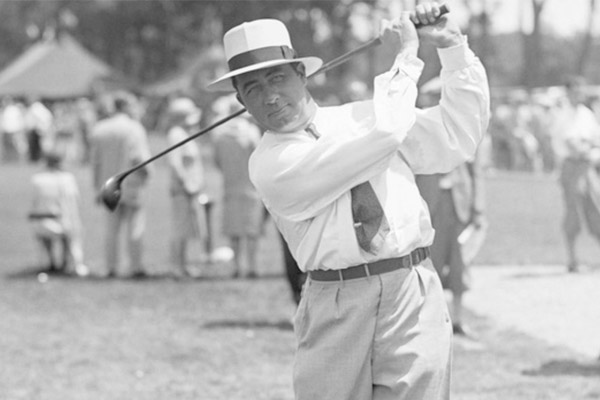
PGA Tour Victories: 45
Majors Won: 11 (1914 U.S. Open, 1919 U.S. Open, 1921 PGA Championship, 1922 British Open, 1924 British Open, 1924 PGA Championship, 1925 PGA Championship, 1926 PGA Championship, 1927 PGA Championship, 1928 British Open, 1929 British Open)
Walter Hagen is one of three golfers to win at least 10 majors in his career. The others—Tiger Woods and Jack Nicklaus—are always the top two guys in any ranking of the greatest PGA golfers of all time. But in part because he played so long ago, Hagen is often an afterthought on these lists.
The most remarkable thing about Hagen’s achievements was the limited opportunities he had to play in majors. He never won the Masters because it wasn’t founded until 1934, which was well past his prime. And from 1915 to 1919 (ages 23-27 for Hagen), there was an average of just one major per year because of World War I. In all, there were 37 majors held from 1914 to 1929, and Hagen won 11 of them.
Though not officially considered one, the Western Open was effectively the fourth major during Hagen’s time, as it was one of the events that all of the top golfers played. It was a tournament that Hagen won five times (1916, 1921, 1926, 1927, 1932) in his career, so some would argue he actually won 16 majors.
Hagen is often credited for making professional golf what it is today, championed by the World Golf Hall of Fame as “the world’s first full-time tournament professional.” Hagen is also considered perhaps the greatest match-play golfer ever, winning the PGA Championship four consecutive years (1924-27) when it was a match-play event.
3. Ben Hogan
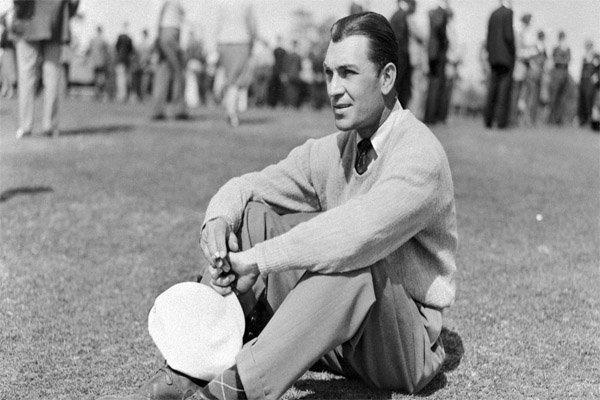
PGA Tour Victories: 64
Majors Won: 9 (1946 PGA Championship, 1948 U.S. Open, 1948 PGA Championship, 1950 U.S. Open, 1951 Masters, 1951 U.S. Open, 1953 Masters, 1953 U.S. Open, 1953 British Open)
Hogan won a career-best 13 tournaments in 1946 alone, including the first of his nine majors. From 1946 to 1948, he won a total of 30 tournaments and was named the PGA Player of the Year in 1948, taking both the U.S. Open and PGA Championship that year. (Hogan also won POY in 1950, 1951 and 1953.)
Because of the accident and because he typically didn’t play in the British Open or the PGA Championship, those 11 tournaments were spread out over the course of six seasons, somewhat obscuring how incredible the feat was. But he went 3-of-3 in 1953, winning the Masters, U.S. Open and British Open—the only time in his career that he entered the British Open.
From 1940 to 1956, Hogan played in 32 majors. (It would have been more if not for WWII.) With the exception of the 1947 PGA Championship, he finished in the top 10 in each of those 32 tournaments, placed in the top four 21 times and had a total of nine wins.And in the 1942 Masters, 1954 Masters and 1955 U.S. Open, Hogan lost in a playoff, so he was that close to double-digit majors.
Over the course of his entire career, Hogan placed in the top 10 in 40 of 58 majors. That’s 69.0 percent, compared to 49.4 percent (38 of 77) for Woods and 44.5 percent (73 of 164) for Jack Nicklaus. Had Hogan played in as many tournaments as those guys did, there’s a good chance he’d be the undisputed greatest of all time.
2. Tiger Woods
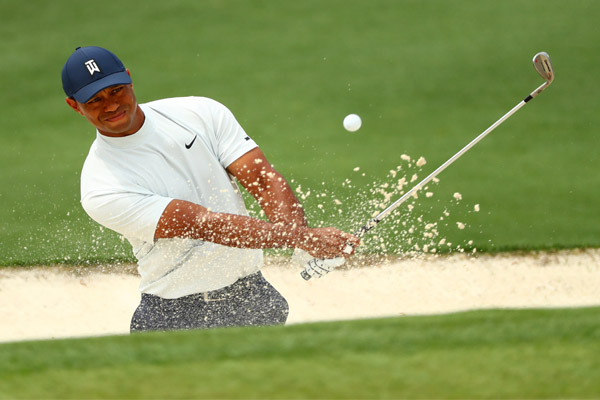
PGA Tour Victories: 79
Majors Won: 14 (1997 Masters, 1999 PGA Championship, 2000 U.S. Open, 2000 British Open, 2000 PGA Championship, 2001 Masters, 2002 Masters, 2002 U.S. Open, 2005 Masters, 2005 British Open, 2006 British Open, 2006 PGA Championship, 2007 PGA Championship, 2008 U.S. Open)
At his peak, Tiger Woods was a god among men, and it seemed only a matter of time before he obliterated every record ever set on the PGA Tour.
From 1997 through 2008, Woods finished in the top 30 in 44 of 46 consecutive majors, winning 14 of them. In 2000-01, he won four straight majors, becoming the only person to ever hold all four titles at the same time. And that wasn’t even the most impressive stretch of his career, as Woods later placed top four in 12 of 14 majors from 2005 through 2008 with six wins.
Woods won all 14 of his majors (at least three of each) and 65 of his 79 total PGA events before turning 33. It got to the point where you just assumed, he would come back and win if he was within four strokes of the lead heading into Sunday. And if he had a 54-hole lead in a major, forget about it. The only question for the final 18 was: How many strokes will Tiger win by?
But after multiple knee and back surgeries, an infidelity scandal in 2009 and a DUI arrest in 2017, the most recent decade of Woods’ career has left us to wonder what could have been.
Once a mortal lock to leave Jack Nicklaus’ record of 18 majors in the dust, Woods has been stuck on 14 since the 2008 U.S. Open. He has had a half-dozen top-five finishes in majors during the past decade, but that only puts him at 31 in his career—25 shy of Nicklaus’ 56.
There are thousands maybe millions? of people who only became golf fans because of Woods. Unless he goes through a renaissance by winning at least one more major, though, he’ll remain a distant No. 2 on the list of the PGA’s all-time greats.
1. Jack Nicklaus
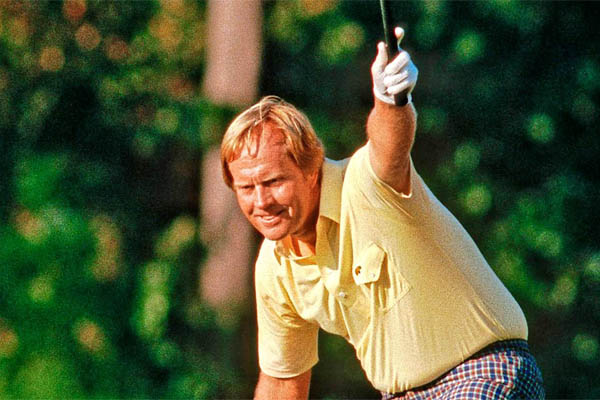
PGA Tour Victories: 73
Majors Won: 18 (1962 U.S. Open, 1963 Masters, 1963 PGA Championship, 1965 Masters, 1966 Masters, 1966 British Open, 1967 U.S. Open, 1970 British Open, 1971 PGA Championship, 1972 Masters, 1972 U.S. Open, 1973 PGA Championship, 1975 Masters, 1975 PGA Championship, 1978 British Open, 1980 U.S. Open, 1980 PGA Championship, 1986 Masters)
Both Sam Snead and Tiger Woods ended up winning more total events on the PGA Tour than Jack Nicklaus, but the Golden Bear was in a class of his own at majors.
Not only did Nicklaus win 18 majors, but he was also the runner-up 19 times. He won each major at least three times and finished in the top two at least eight times in each major.
No other golfer had more than 46 top-10 finishes, but Nicklaus was a top-10 finisher 73 times and finished in the top five 56 times. At his peak from 1971 through 1977, Nicklaus placed top five in 23 of 28 majors, including six wins.
Nicklaus’ career rate of top-10 finishes in majors was 44.5 percent, but that’s largely because he continued golfing long past his prime. He finished outside the top 10 in 65 of his final 72 majors. From 1960 through 1982, though, Nicklaus played in a total of 88 majors.
He won 19.3 percent of them (17), placed in the top five 60.2 percent of the time (53) and finished 10th or better 75.0 percent of the time (66). Even at Woods’ 12-year peak from 1998 through 2009, he only finished in the top 10 in 33 of 48 majors (68.8 percent). It’s almost not fair that Nicklaus was even more consistent, and for a decade longer
